brakes MERCEDES-BENZ E-SEDAN 2014 Owners Manual
[x] Cancel search | Manufacturer: MERCEDES-BENZ, Model Year: 2014, Model line: E-SEDAN, Model: MERCEDES-BENZ E-SEDAN 2014Pages: 430, PDF Size: 5.8 MB
Page 8 of 430
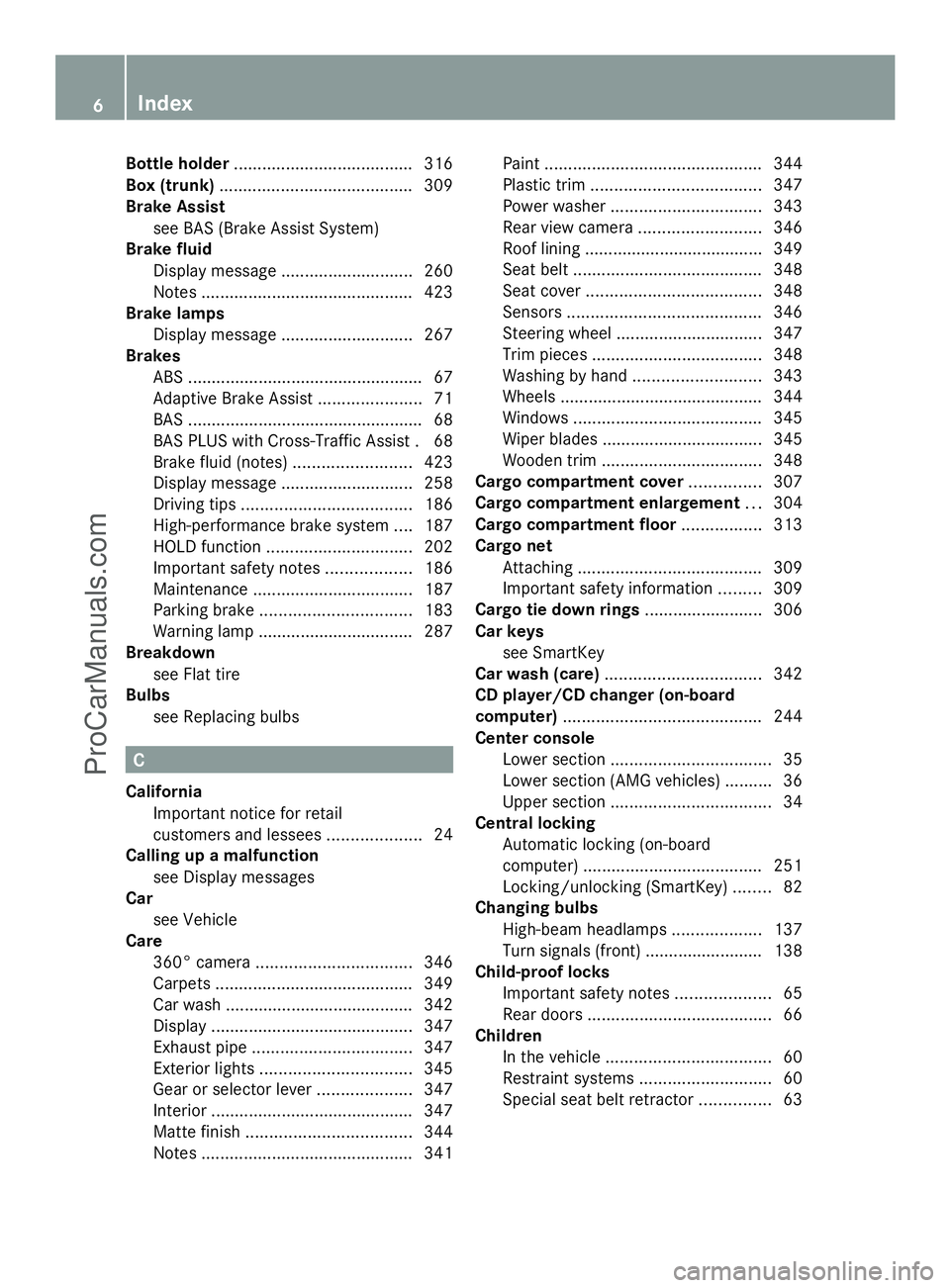
Bottle holder
...................................... 316
Box (trunk) ......................................... 309
Brake Assist see BAS (Brake Assist System)
Brake fluid
Display message ............................ 260
Notes ............................................. 423
Brake lamps
Display message ............................ 267
Brakes
ABS .................................................. 67
Adaptive Brake Assist ......................71
BAS .................................................. 68
BAS PLUS with Cross-Traffic Assist .68
Brake fluid (notes) .........................423
Display message ............................ 258
Driving tips .................................... 186
High-performance brake system ....187
HOLD function ............................... 202
Important safety notes ..................186
Maintenance .................................. 187
Parking brake ................................ 183
Warning lamp ................................. 287
Breakdown
see Flat tire
Bulbs
see Replacing bulbs C
California Important notice for retail
customers and lessees ....................24
Calling up a malfunction
see Display messages
Car
see Vehicle
Care
360° camera ................................. 346
Carpets .......................................... 349
Car wash ........................................ 342
Display ........................................... 347
Exhaust pipe .................................. 347
Exterior lights ................................ 345
Gear or selector lever ....................347
Interior ........................................... 347
Matte finish ................................... 344
Notes ............................................. 341Paint
.............................................. 344
Plastic trim .................................... 347
Power washer ................................ 343
Rear view camera .......................... 346
Roof lining ...................................... 349
Seat belt ........................................ 348
Seat cover ..................................... 348
Sensors ......................................... 346
Steering wheel ............................... 347
Trim pieces .................................... 348
Washing by hand ........................... 343
Wheels ........................................... 344
Windows ........................................ 345
Wiper blades .................................. 345
Wooden trim .................................. 348
Cargo compartment cover ...............307
Cargo compartment enlargement ...304
Cargo compartment floor .................313
Cargo net Attaching ....................................... 309
Important safety information .........309
Cargo tie down rings .........................306
Car keys see SmartKey
Car wash (care) ................................. 342
CD player/CD changer (on-board
computer) .......................................... 244
Center console Lower section .................................. 35
Lower section (AMG vehicles) ..........36
Upper section .................................. 34
Central locking
Automatic locking (on-board
computer) ...................................... 251
Locking/unlocking (SmartKey) ........82
Changing bulbs
High-beam headlamps ...................137
Turn signals (front) ......................... 138
Child-proof locks
Important safety notes ....................65
Rear doors ....................................... 66
Children
In the vehicle ................................... 60
Restraint systems ............................ 60
Special seat belt retractor ...............63 6
IndexProCarManuals.com
Page 11 of 430
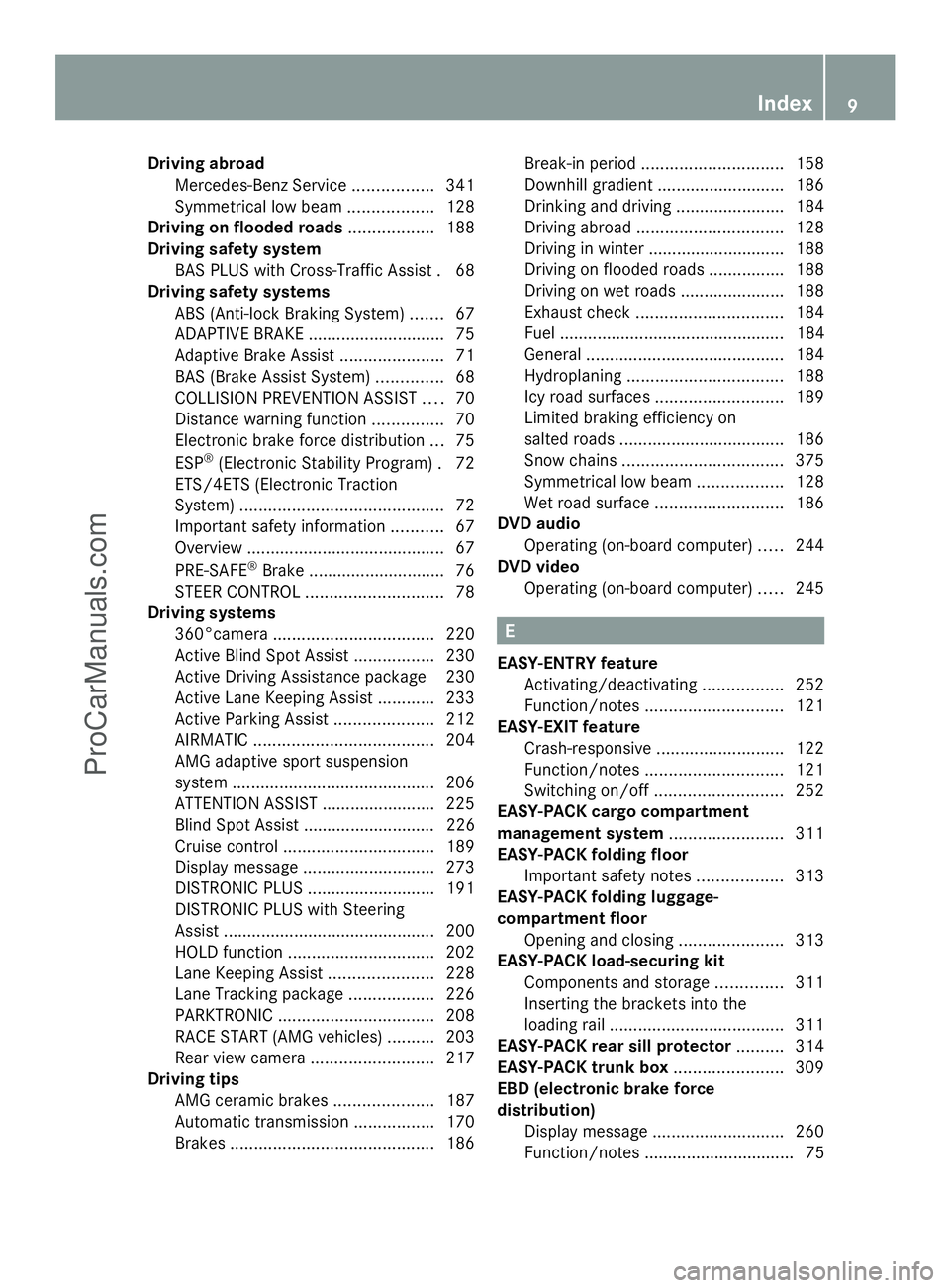
Driving abroad
Mercedes-Benz Service .................341
Symmetrical low bea m.................. 128
Driving on flooded roads ..................188
Driving safety system BAS PLUS with Cross-Traffic Assist .68
Driving safety systems
ABS (Anti-lock Braking System) .......67
ADAPTIVE BRAKE ............................. 75
Adaptive Brake Assist ......................71
BAS (Brake Assist System) ..............68
COLLISION PREVENTION ASSIST ....70
Distance warning function ...............70
Electronic brake force distribution ...75
ESP ®
(Electronic Stability Program) .72
ETS/4ETS (Electronic Traction
System) ........................................... 72
Important safety information ...........67
Overview .......................................... 67
PRE-SAFE ®
Brake ............................ .76
STEER CONTROL ............................. 78
Driving systems
360°camera .................................. 220
Active Blind Spot Assist .................230
Active Driving Assistance package 230
Active Lane Keeping Assist ............233
Active Parking Assist .....................212
AIRMATIC ...................................... 204
AMG adaptive sport suspension
system ........................................... 206
ATTENTION ASSIST ........................225
Blind Spot Assist ............................ 226
Cruise control ................................ 189
Display message ............................ 273
DISTRONIC PLUS ........................... 191
DISTRONIC PLUS with Steering
Assist ............................................. 200
HOLD function ............................... 202
Lane Keeping Assist ......................228
Lane Tracking package ..................226
PARKTRONIC ................................. 208
RACE START (AMG vehicles) ..........203
Rear view camera .......................... 217
Driving tips
AMG ceramic brakes .....................187
Automatic transmission .................170
Brakes ........................................... 186Break-in period
.............................. 158
Downhill gradient ........................... 186
Drinking and driving .......................184
Driving abroad ............................... 128
Driving in winter ............................ .188
Driving on flooded roads ................188
Driving on wet roads ......................188
Exhaust check ............................... 184
Fuel ................................................ 184
General .......................................... 184
Hydroplaning ................................. 188
Icy road surfaces ........................... 189
Limited braking efficiency on
salted road s................................... 186
Snow chains .................................. 375
Symmetrical low bea m.................. 128
Wet road surface ........................... 186
DVD audio
Operating (on-board computer) .....244
DVD video
Operating (on-board computer) .....245 E
EASY-ENTRY feature Activating/deactivating .................252
Function/notes ............................. 121
EASY-EXIT feature
Crash-responsive ........................... 122
Function/notes ............................. 121
Switching on/off ........................... 252
EASY-PACK cargo compartment
management system ........................311
EASY-PACK folding floor Important safety notes ..................313
EASY-PACK folding luggage-
compartment floor
Opening and closing ......................313
EASY-PACK load-securing kit
Components and storage ..............311
Inserting the brackets into the
loading rai l..................................... 311
EASY-PACK rear sill protector ..........314
EASY-PACK trunk box .......................309
EBD (electronic brake force
distribution)
Display message ............................ 260
Function/notes ................................ 75 Index
9ProCarManuals.com
Page 23 of 430
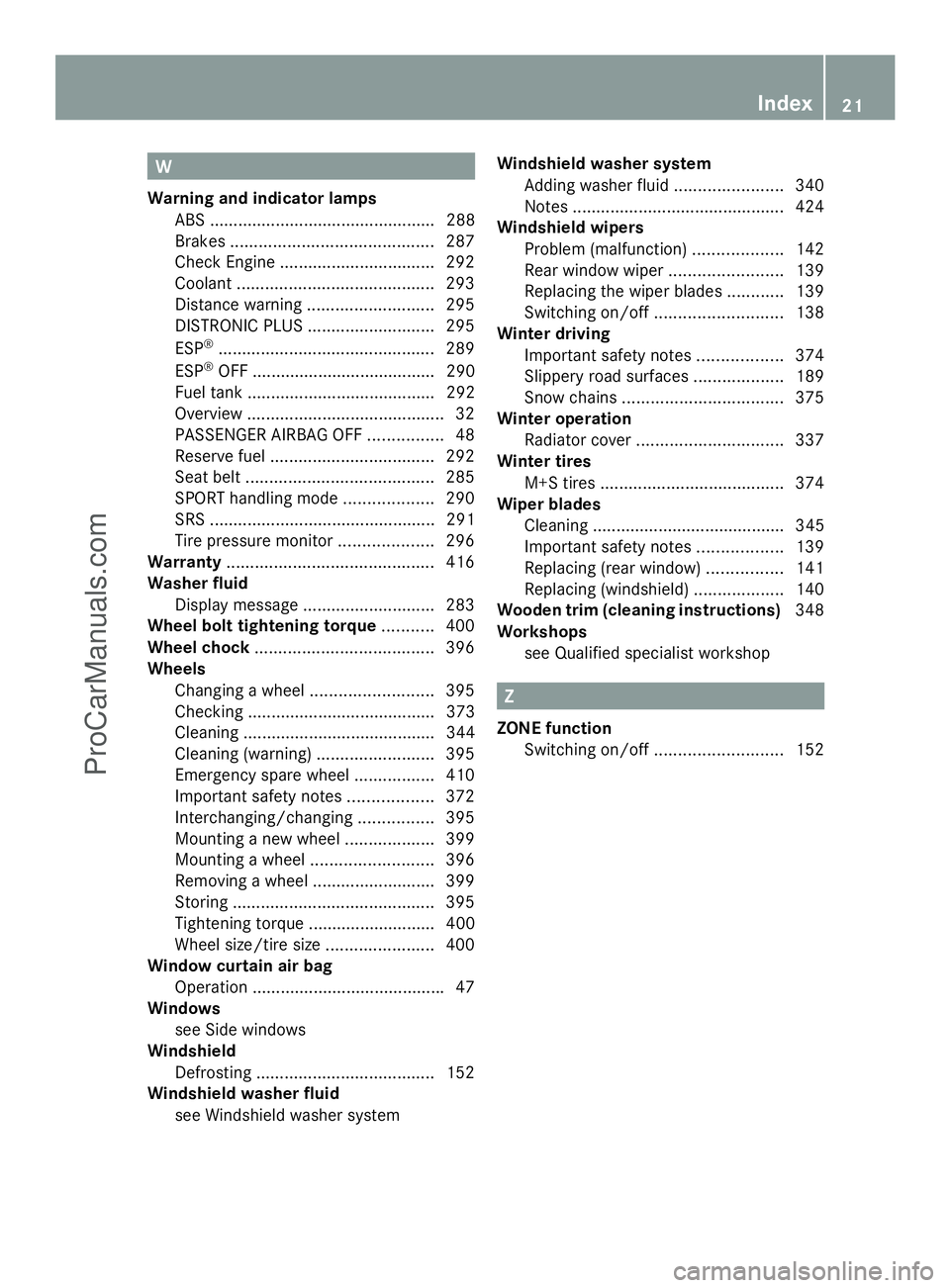
W
Warning and indicator lamps ABS ................................................ 288
Brakes ........................................... 287
Check Engine ................................. 292
Coolant .......................................... 293
Distance warning ........................... 295
DISTRONIC PLUS ........................... 295
ESP ®
.............................................. 289
ESP ®
OFF ....................................... 290
Fuel tank ........................................ 292
Overview .......................................... 32
PASSENGER AIRBAG OFF ................48
Reserve fuel ................................... 292
Seat belt ........................................ 285
SPORT handling mode ...................290
SRS ................................................ 291
Tire pressure monitor ....................296
Warranty ............................................ 416
Washer fluid Display message ............................ 283
Wheel bolt tightening torque ...........400
Wheel chock ...................................... 396
Wheels Changing a wheel .......................... 395
Checking ........................................ 373
Cleaning ......................................... 344
Cleaning (warning) .........................395
Emergency spare wheel .................410
Important safety notes ..................372
Interchanging/changing ................395
Mounting a new wheel ...................399
Mounting a wheel .......................... 396
Removing a wheel ..........................399
Storing ........................................... 395
Tightening torque ........................... 400
Wheel size/tire size .......................400
Window curtain air bag
Operation ........................................ .47
Windows
see Side windows
Windshield
Defrosting ...................................... 152
Windshield washer fluid
see Windshield washer system Windshield washer system
Adding washer fluid .......................340
Notes ............................................. 424
Windshield wipers
Problem (malfunction) ...................142
Rear window wiper ........................139
Replacing the wiper blades ............139
Switching on/off ........................... 138
Winter driving
Important safety notes ..................374
Slippery road surfaces ...................189
Snow chains .................................. 375
Winter operation
Radiator cover ............................... 337
Winter tires
M+S tires ....................................... 374
Wiper blades
Cleaning ......................................... 345
Important safety notes ..................139
Replacing (rear window) ................141
Replacing (windshield )................... 140
Wooden trim (cleaning instructions) 348
Workshops see Qualified specialist workshop Z
ZONE function Switching on/off ........................... 152 Index
21ProCarManuals.com
Page 34 of 430
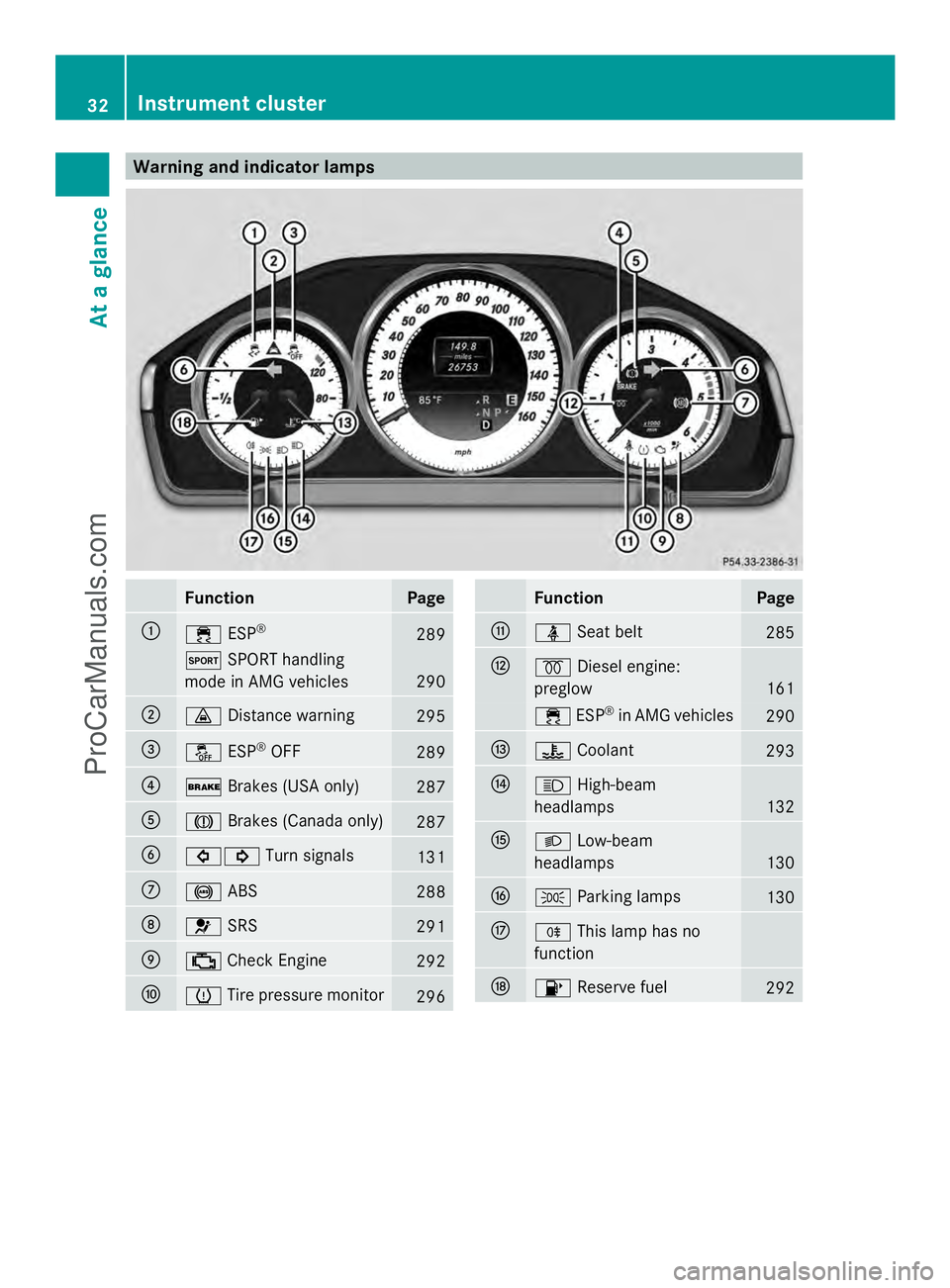
Warning and indicator lamps
Function Page
:
÷
ESP® 289
M
SPORT handling
mode in AMG vehicles 290
;
·
Distance warning 295
=
å
ESP®
OFF 289
?
$
Brakes (USA only) 287
A
J
Brakes (Canada only) 287
B
#!
Turn signals 131
C
!
ABS 288
D
6
SRS 291
E
;
Check Engine 292
F
h
Tire pressure monitor 296 Function Page
G
ü
Seat belt 285
H
%
Diesel engine:
preglow 161
÷
ESP®
in AMG vehicles 290
I
?
Coolant 293
J
K
High-beam
headlamps 132
K
L
Low-beam
headlamps 130
L
T
Parking lamps 130
M
R
This lamp has no
function N
8
Reserve fuel 29232
Instrument clusterAt a glance
ProCarManuals.com
Page 70 of 430
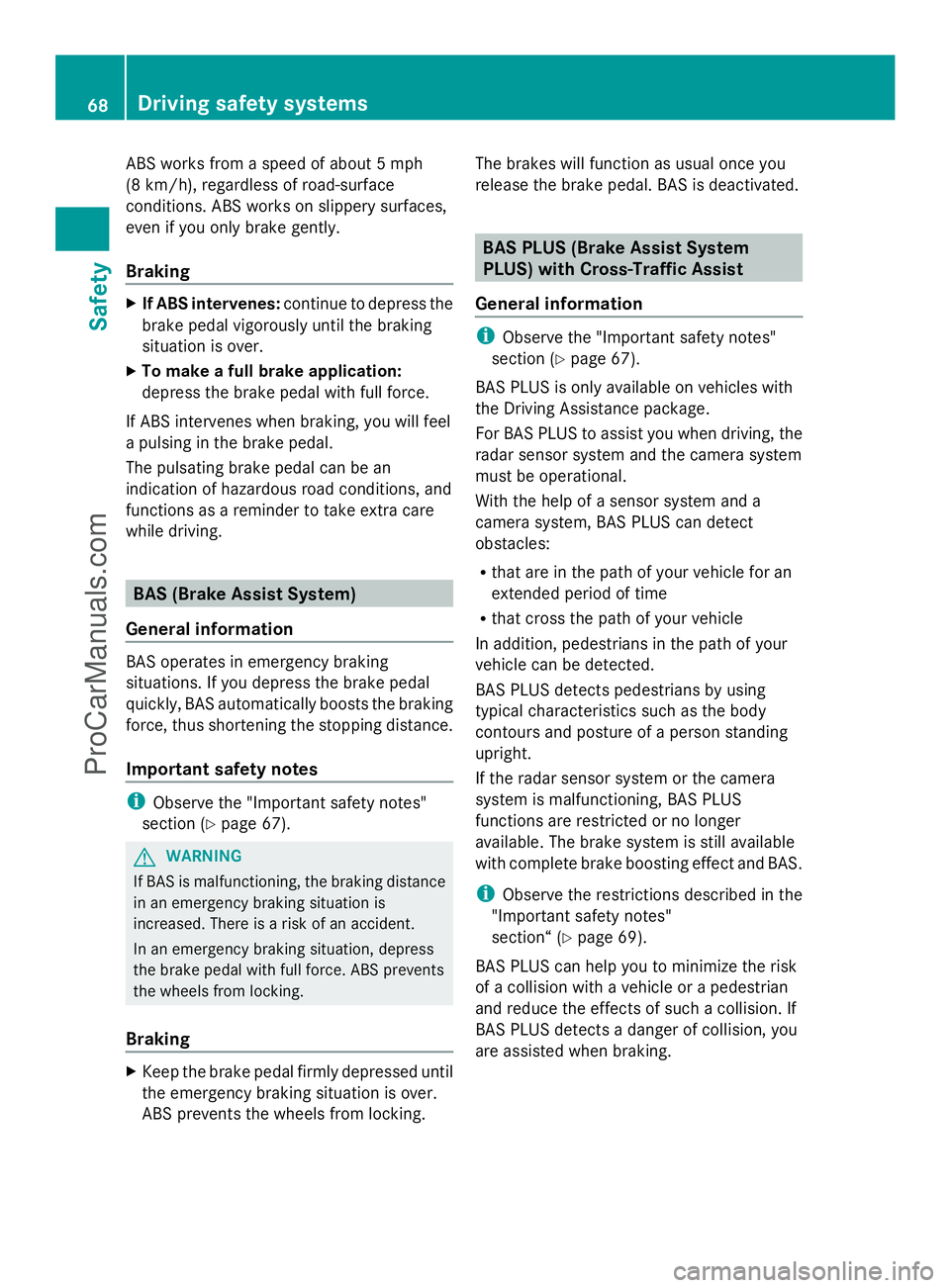
ABS works from a speed of about 5 mph
(8 km/h), regardless of road-surface
conditions. ABS works on slippery surfaces,
even if you only brake gently.
Braking X
If ABS intervenes: continue to depress the
brake pedal vigorously until the braking
situation is over.
X To make a full brake application:
depress the brake pedal with full force.
If ABS intervenes when braking, you will feel
a pulsing in the brake pedal.
The pulsating brake pedal can be an
indication of hazardous road conditions, and
functions as a reminder to take extra care
while driving. BAS (Brake Assist System)
General information BAS operates in emergency braking
situations. If you depress the brake pedal
quickly, BAS automatically boosts the braking
force, thus shortening the stopping distance.
Important safety notes i
Observe the "Important safety notes"
section ( Ypage 67). G
WARNING
If BAS is malfunctioning, the braking distance
in an emergency braking situation is
increased. There is a risk of an accident.
In an emergency braking situation, depress
the brake pedal with full force. ABS prevents
the wheels from locking.
Braking X
Keep the brake pedal firmly depressed until
the emergency braking situation is over.
ABS prevents the wheels from locking. The brakes will function as usual once you
release the brake pedal. BAS is deactivated. BAS PLUS (Brake Assist System
PLUS) with Cross-Traffic Assist
General information i
Observe the "Important safety notes"
section ( Ypage 67).
BAS PLUS is only available on vehicles with
the Driving Assistance package.
For BAS PLUS to assist you when driving, the
radar sensor system and the camera system
must be operational.
With the help of a sensor system and a
camera system, BAS PLUS can detect
obstacles:
R that are in the path of your vehicle for an
extended period of time
R that cross the path of your vehicle
In addition, pedestrians in the path of your
vehicle can be detected.
BAS PLUS detects pedestrians by using
typical characteristics such as the body
contours and posture of a person standing
upright.
If the radar sensor system or the camera
system is malfunctioning, BAS PLUS
functions are restricted or no longer
available. The brake system is still available
with complete brake boosting effect and BAS.
i Observe the restrictions described in the
"Important safety notes"
section“ (Y page 69).
BAS PLUS can help you to minimize the risk
of a collision with a vehicle or a pedestrian
and reduce the effects of such a collision. If
BAS PLUS detects a danger of collision, you
are assisted when braking. 68
Driving safety systemsSafety
ProCarManuals.com
Page 72 of 430
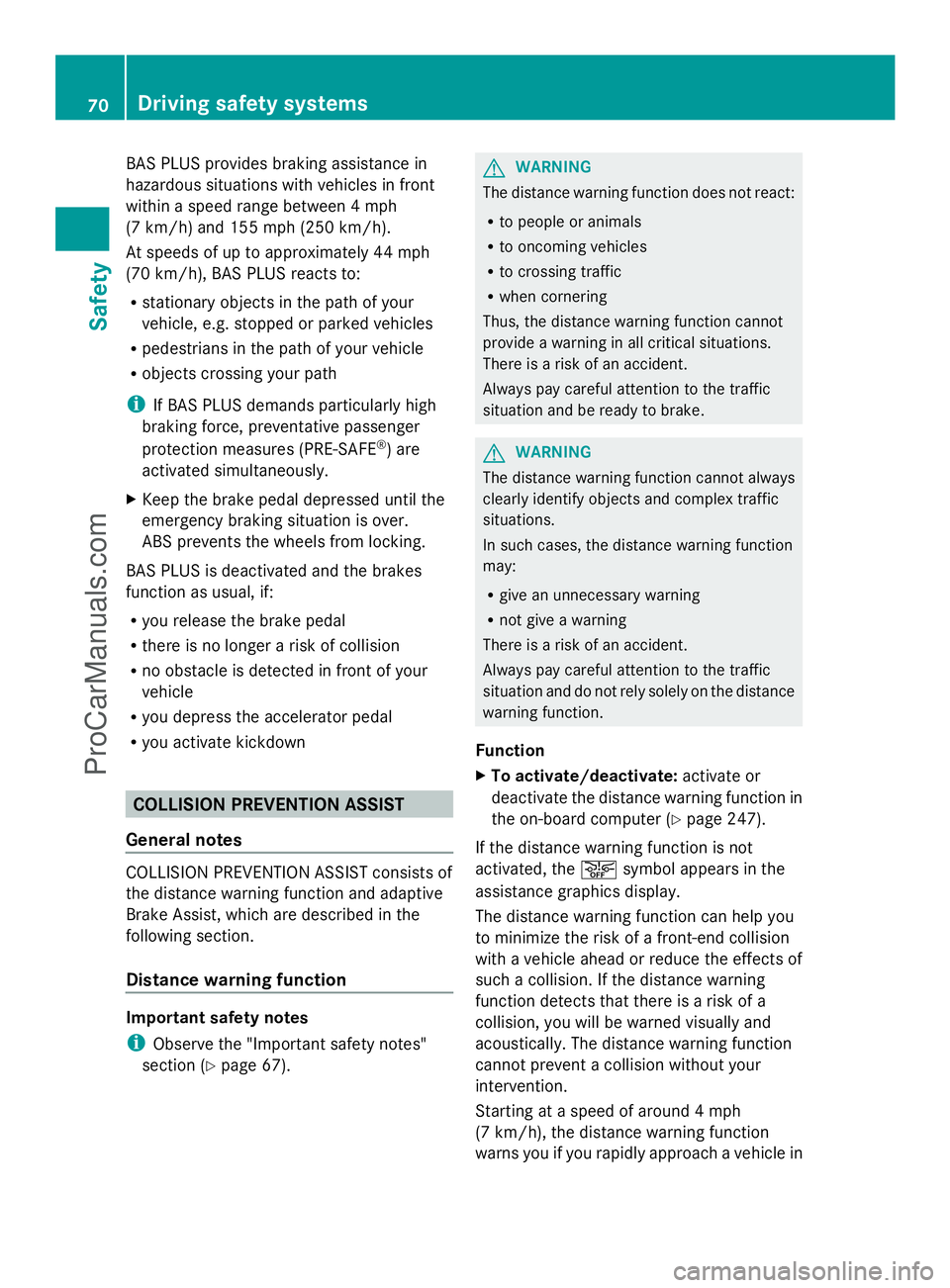
BAS PLUS provides braking assistance in
hazardous situations with vehicles in front
within a speed range between 4 mph
(7 km/h) and 155 mph (250 km/h).
At speeds of up to approximately 44 mph
(70 km/h), BAS PLUS reacts to:
R stationary objects in the path of your
vehicle, e.g. stopped or parked vehicles
R pedestrians in the path of your vehicle
R objects crossing your path
i If BAS PLUS demands particularly high
braking force, preventative passenger
protection measures (PRE-SAFE ®
) are
activated simultaneously.
X Keep the brake pedal depressed until the
emergency braking situation is over.
ABS prevents the wheels from locking.
BAS PLUS is deactivated and the brakes
function as usual, if:
R you release the brake pedal
R there is no longer a risk of collision
R no obstacle is detected in front of your
vehicle
R you depress the accelerator pedal
R you activate kickdown COLLISION PREVENTION ASSIST
General notes COLLISION PREVENTION ASSIST consists of
the distance warning function and adaptive
Brake Assist, which are described in the
following section.
Distance warning function Important safety notes
i
Observe the "Important safety notes"
section (Y page 67). G
WARNING
The distance warning function does not react:
R to people or animals
R to oncoming vehicles
R to crossing traffic
R when cornering
Thus, the distance warning function cannot
provide a warning in all critical situations.
There is a risk of an accident.
Always pay careful attention to the traffic
situation and be ready to brake. G
WARNING
The distance warning function cannot always
clearly identify objects and complex traffic
situations.
In such cases, the distance warning function
may:
R give an unnecessary warning
R not give a warning
There is a risk of an accident.
Always pay careful attention to the traffic
situation and do not rely solely on the distance
warning function.
Function
X To activate/deactivate: activate or
deactivate the distance warning function in
the on-board computer (Y page 247).
If the distance warning function is not
activated, the æsymbol appears in the
assistance graphics display.
The distance warning function can help you
to minimize the risk of a front-end collision
with a vehicle ahead or reduce the effects of
such a collision. If the distance warning
function detects that there is a risk of a
collision, you will be warned visually and
acoustically. The distance warning function
cannot prevent a collision without your
intervention.
Starting at a speed of around 4 mph
(7 km/h), the distance warning function
warns you if you rapidly approach a vehicle in 70
Driving safety systemsSafety
ProCarManuals.com
Page 73 of 430
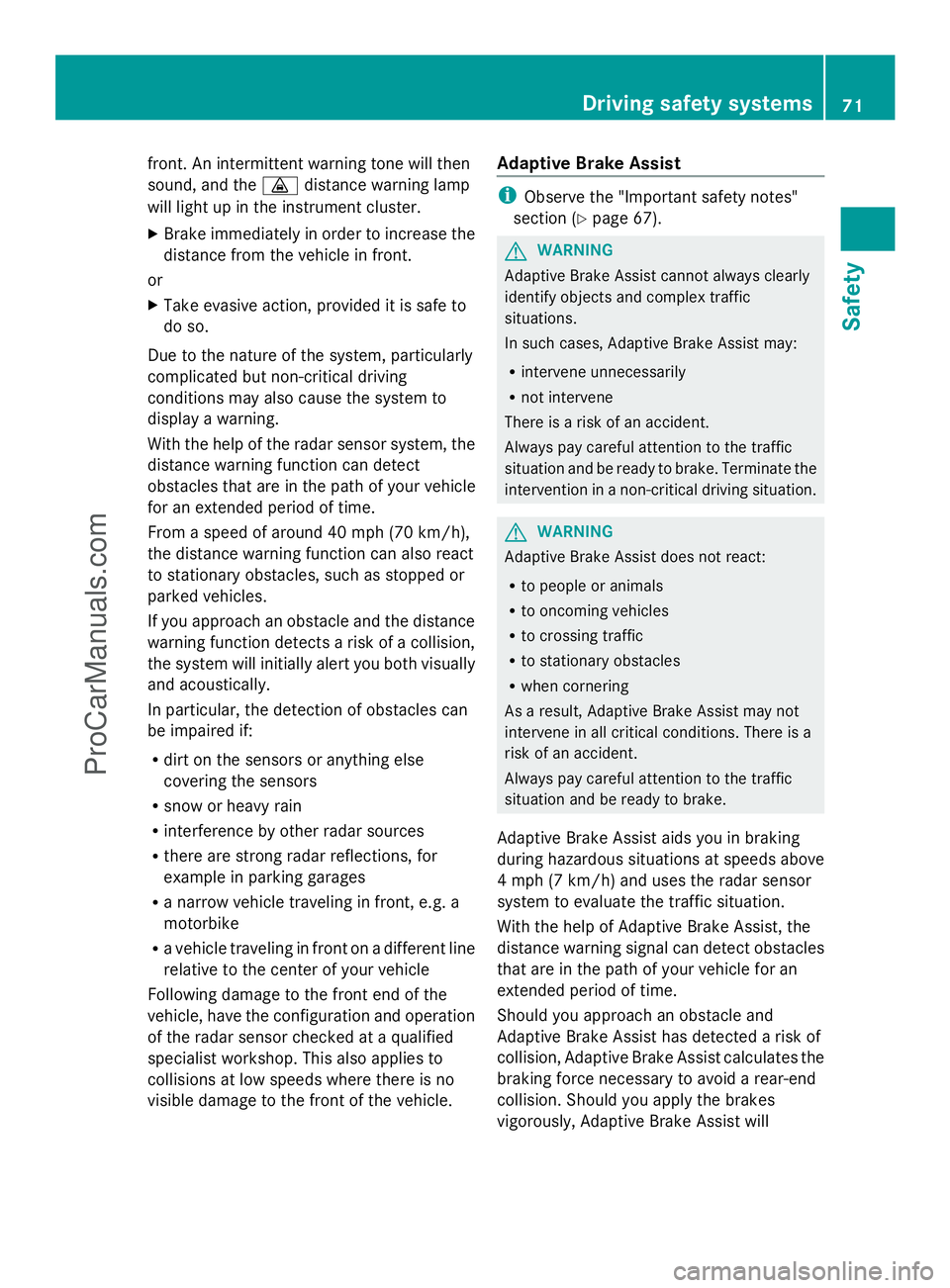
front. An intermittent warning tone will then
sound, and the ·distance warning lamp
will light up in the instrument cluster.
X Brake immediately in order to increase the
distance from the vehicle in front.
or
X Take evasive action, provided it is safe to
do so.
Due to the nature of the system, particularly
complicated but non-critical driving
conditions may also cause the system to
display a warning.
With the help of the radar sensor system, the
distance warning function can detect
obstacles that are in the path of your vehicle
for an extended period of time.
From a speed of around 40 mph (70 km/h),
the distance warning function can also react
to stationary obstacles, such as stopped or
parked vehicles.
If you approach an obstacle and the distance
warning function detects a risk of a collision,
the system will initially alert you both visually
and acoustically.
In particular, the detection of obstacles can
be impaired if:
R dirt on the sensors or anything else
covering the sensors
R snow or heavy rain
R interference by other radar sources
R there are strong radar reflections, for
example in parking garages
R a narrow vehicle traveling in front, e.g. a
motorbike
R a vehicle traveling in front on a different line
relative to the center of your vehicle
Following damage to the front end of the
vehicle, have the configuration and operation
of the radar sensor checked at a qualified
specialist workshop. This also applies to
collisions at low speeds where there is no
visible damage to the front of the vehicle. Adaptive Brake Assist i
Observe the "Important safety notes"
section (Y page 67). G
WARNING
Adaptive Brake Assist cannot always clearly
identify objects and complex traffic
situations.
In such cases, Adaptive Brake Assist may:
R intervene unnecessarily
R not intervene
There is a risk of an accident.
Always pay careful attention to the traffic
situation and be ready to brake. Terminate the
intervention in a non-critical driving situation. G
WARNING
Adaptive Brake Assist does not react:
R to people or animals
R to oncoming vehicles
R to crossing traffic
R to stationary obstacles
R when cornering
As a result, Adaptive Brake Assist may not
intervene in all critical conditions. There is a
risk of an accident.
Always pay careful attention to the traffic
situation and be ready to brake.
Adaptive Brake Assist aids you in braking
during hazardous situations at speeds above
4 mph (7 km/h) and uses the radar sensor
system to evaluate the traffic situation.
With the help of Adaptive Brake Assist, the
distance warning signal can detect obstacles
that are in the path of your vehicle for an
extended period of time.
Should you approach an obstacle and
Adaptive Brake Assist has detected a risk of
collision, Adaptive Brake Assist calculates the
braking force necessary to avoid a rear-end
collision. Should you apply the brakes
vigorously, Adaptive Brake Assist will Driving safety systems
71Safety Z
ProCarManuals.com
Page 74 of 430
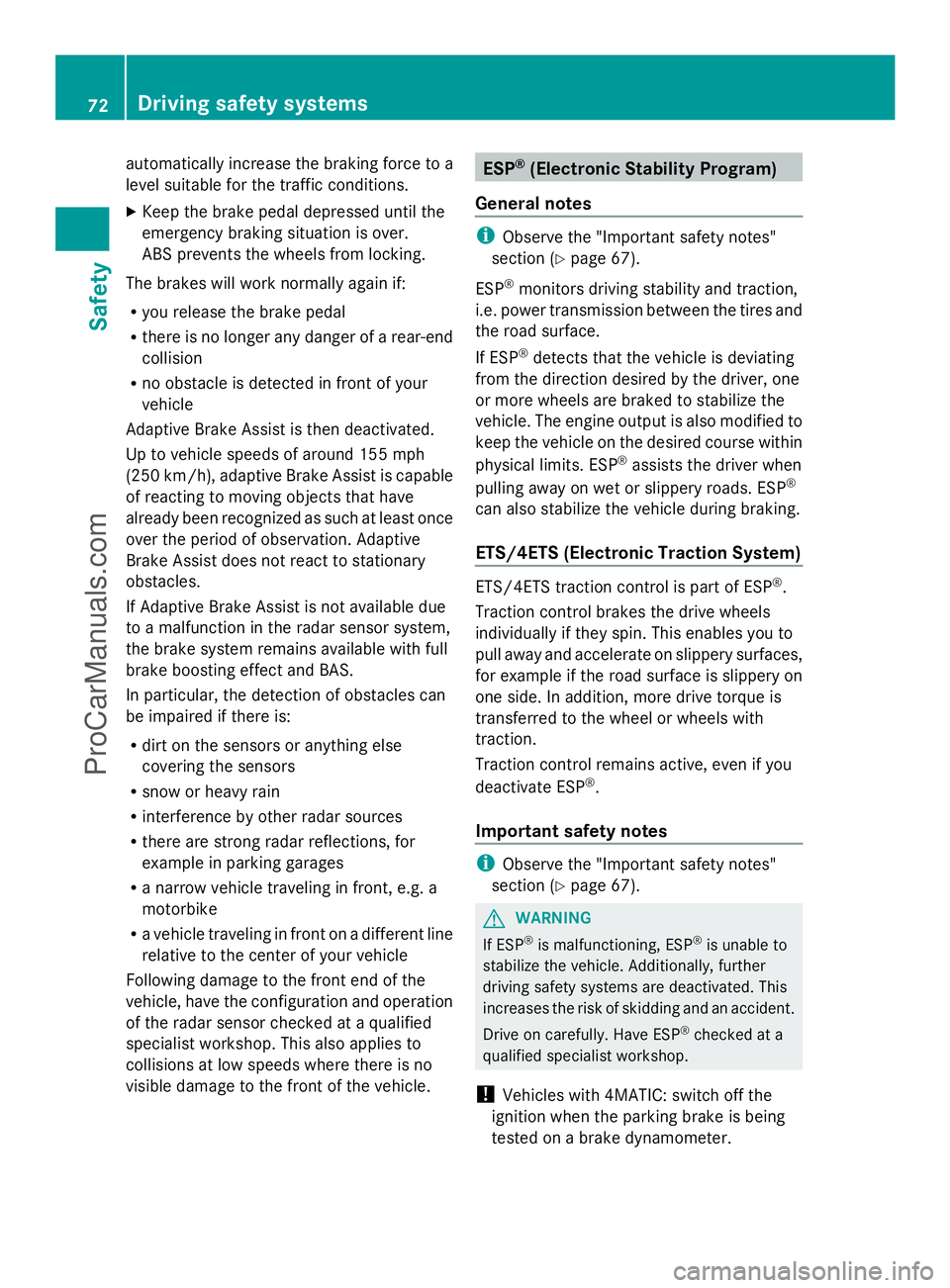
automatically increase the braking force to a
level suitable for the traffic conditions.
X Keep the brake pedal depressed until the
emergency braking situation is over.
ABS prevents the wheels from locking.
The brakes will work normally again if:
R you release the brake pedal
R there is no longer any danger of a rear-end
collision
R no obstacle is detected in front of your
vehicle
Adaptive Brake Assist is then deactivated.
Up to vehicle speeds of around 155 mph
(250 km/h), adaptive Brake Assist is capable
of reacting to moving objects that have
already been recognized as such at least once
over the period of observation. Adaptive
Brake Assist does not react to stationary
obstacles.
If Adaptive Brake Assist is not available due
to a malfunction in the radar sensor system,
the brake system remains available with full
brake boosting effect and BAS.
In particular, the detection of obstacles can
be impaired if there is:
R dirt on the sensors or anything else
covering the sensors
R snow or heavy rain
R interference by other radar sources
R there are strong radar reflections, for
example in parking garages
R a narrow vehicle traveling in front, e.g. a
motorbike
R a vehicle traveling in front on a different line
relative to the center of your vehicle
Following damage to the front end of the
vehicle, have the configuration and operation
of the radar sensor checked at a qualified
specialist workshop. This also applies to
collisions at low speeds where there is no
visible damage to the front of the vehicle. ESP
®
(Electronic Stability Program)
General notes i
Observe the "Important safety notes"
section (Y page 67).
ESP ®
monitors driving stability and traction,
i.e. power transmission between the tires and
the road surface.
If ESP ®
detects that the vehicle is deviating
from the direction desired by the driver, one
or more wheels are braked to stabilize the
vehicle. The engine output is also modified to
keep the vehicle on the desired course within
physical limits. ESP ®
assists the driver when
pulling away on wet or slippery roads. ESP ®
can also stabilize the vehicle during braking.
ETS/4ETS (Electronic Traction System) ETS/4ETS traction control is part of ESP
®
.
Traction control brakes the drive wheels
individually if they spin. This enables you to
pull away and accelerate on slippery surfaces,
for example if the road surface is slippery on
one side. In addition, more drive torque is
transferred to the wheel or wheels with
traction.
Traction control remains active, even if you
deactivate ESP ®
.
Important safety notes i
Observe the "Important safety notes"
section (Y page 67). G
WARNING
If ESP ®
is malfunctioning, ESP ®
is unable to
stabilize the vehicle. Additionally, further
driving safety systems are deactivated. This
increases the risk of skidding and an accident.
Drive on carefully. Have ESP ®
checked at a
qualified specialist workshop.
! Vehicles with 4MATIC: switch off the
ignition when the parking brake is being
tested on a brake dynamometer. 72
Driving safety systemsSafety
ProCarManuals.com
Page 75 of 430
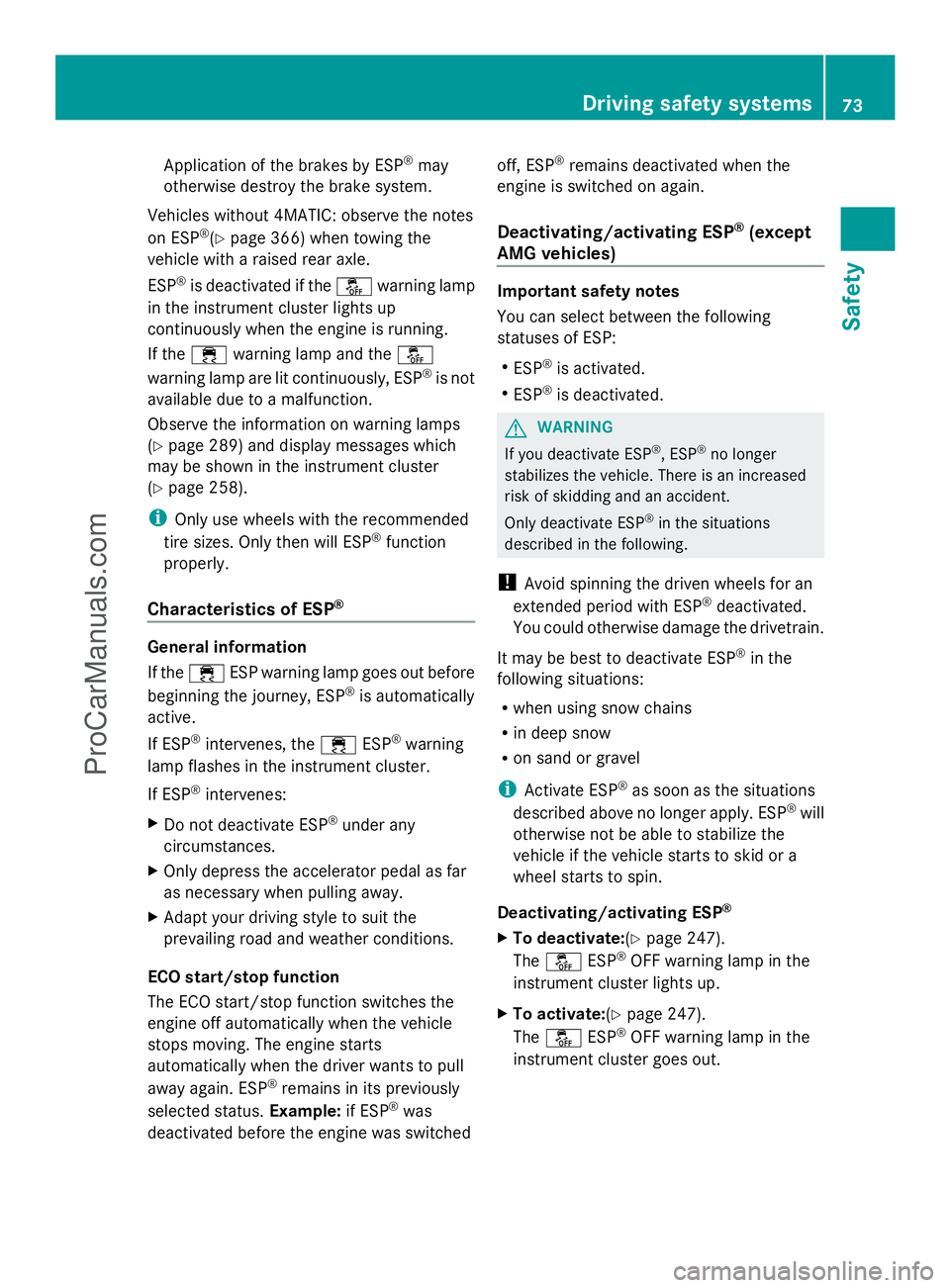
Application of the brakes by ESP
®
may
otherwise destroy the brake system.
Vehicles without 4MATIC: observe the notes
on ESP ®
(Y page 366) when towing the
vehicle with a raised rear axle.
ESP ®
is deactivated if the åwarning lamp
in the instrument cluster lights up
continuously when the engine is running.
If the ÷ warning lamp and the å
warning lamp are lit continuously, ESP ®
is not
available due to a malfunction.
Observe the information on warning lamps
(Y page 289) and display messages which
may be shown in the instrument cluster
(Y page 258).
i Only use wheels with the recommended
tire sizes. Only then will ESP ®
function
properly.
Characteristics of ESP ®General information
If the
÷ ESP warning lamp goes out before
beginning the journey, ESP ®
is automatically
active.
If ESP ®
intervenes, the ÷ESP®
warning
lamp flashes in the instrument cluster.
If ESP ®
intervenes:
X Do not deactivate ESP ®
under any
circumstances.
X Only depress the accelerator pedal as far
as necessary when pulling away.
X Adapt your driving style to suit the
prevailing road and weather conditions.
ECO start/stop function
The ECO start/stop function switches the
engine off automatically when the vehicle
stops moving. The engine starts
automatically when the driver wants to pull
away again. ESP ®
remains in its previously
selected status. Example:if ESP®
was
deactivated before the engine was switched off, ESP
®
remains deactivated when the
engine is switched on again.
Deactivating/activating ESP ®
(except
AMG vehicles) Important safety notes
You can select between the following
statuses of ESP:
R
ESP ®
is activated.
R ESP ®
is deactivated. G
WARNING
If you deactivate ESP ®
, ESP ®
no longer
stabilizes the vehicle. There is an increased
risk of skidding and an accident.
Only deactivate ESP ®
in the situations
described in the following.
! Avoid spinning the driven wheels for an
extended period with ESP ®
deactivated.
You could otherwise damage the drivetrain.
It may be best to deactivate ESP ®
in the
following situations:
R when using snow chains
R in deep snow
R on sand or gravel
i Activate ESP ®
as soon as the situations
described above no longer apply. ESP ®
will
otherwise not be able to stabilize the
vehicle if the vehicle starts to skid or a
wheel starts to spin.
Deactivating/activating ESP ®
X To deactivate:( Ypage 247).
The å ESP®
OFF warning lamp in the
instrument cluster lights up.
X To activate: (Ypage 247).
The å ESP®
OFF warning lamp in the
instrument cluster goes out. Driving safety systems
73Safety Z
ProCarManuals.com
Page 78 of 430
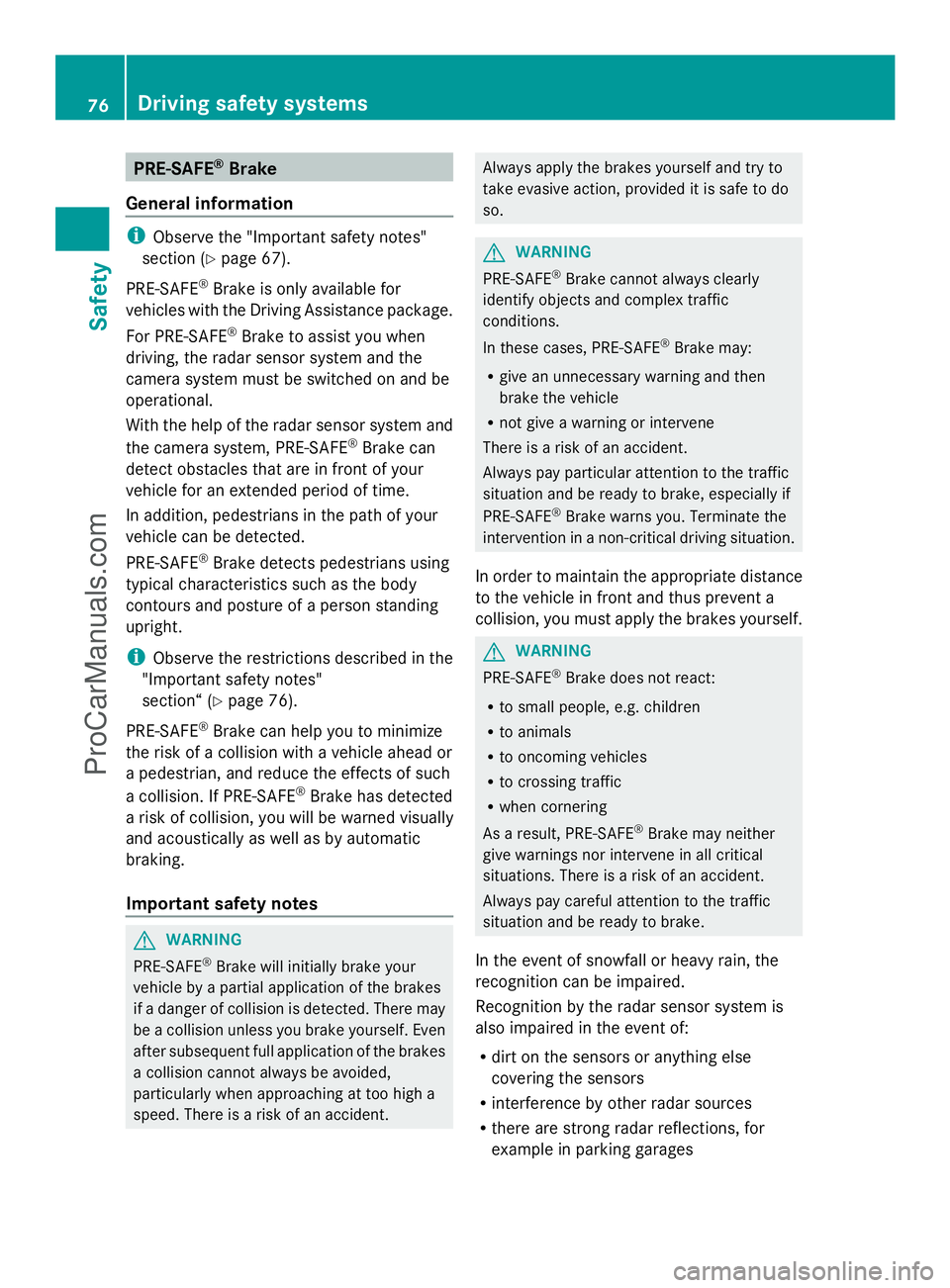
PRE-SAFE
®
Brake
General information i
Observe the "Important safety notes"
section (Y page 67).
PRE-SAFE ®
Brake is only available for
vehicles with the Driving Assistance package.
For PRE-SAFE ®
Brake to assist you when
driving, the radar sensor system and the
camera system must be switched on and be
operational.
With the help of the radar sensor system and
the camera system, PRE-SAFE ®
Brake can
detect obstacles that are in front of your
vehicle for an extended period of time.
In addition, pedestrians in the path of your
vehicle can be detected.
PRE-SAFE ®
Brake detects pedestrians using
typical characteristics such as the body
contours and posture of a person standing
upright.
i Observe the restrictions described in the
"Important safety notes"
section“ (Y page 76).
PRE-SAFE ®
Brake can help you to minimize
the risk of a collision with a vehicle ahead or
a pedestrian, and reduce the effects of such
a collision. If PRE-SAFE ®
Brake has detected
a risk of collision, you will be warned visually
and acoustically as well as by automatic
braking.
Important safety notes G
WARNING
PRE-SAFE ®
Brake will initially brake your
vehicle by a partial application of the brakes
if a danger of collision is detected. There may
be a collision unless you brake yourself. Even
after subsequent full application of the brakes
a collision cannot always be avoided,
particularly when approaching at too high a
speed. There is a risk of an accident. Always apply the brakes yourself and try to
take evasive action, provided it is safe to do
so.
G
WARNING
PRE-SAFE ®
Brake cannot always clearly
identify objects and complex traffic
conditions.
In these cases, PRE-SAFE ®
Brake may:
R give an unnecessary warning and then
brake the vehicle
R not give a warning or intervene
There is a risk of an accident.
Always pay particular attention to the traffic
situation and be ready to brake, especially if
PRE-SAFE ®
Brake warns you. Terminate the
intervention in a non-critical driving situation.
In order to maintain the appropriate distance
to the vehicle in front and thus prevent a
collision, you must apply the brakes yourself. G
WARNING
PRE-SAFE ®
Brake does not react:
R to small people, e.g. children
R to animals
R to oncoming vehicles
R to crossing traffic
R when cornering
As a result, PRE-SAFE ®
Brake may neither
give warnings nor intervene in all critical
situations. There is a risk of an accident.
Always pay careful attention to the traffic
situation and be ready to brake.
In the event of snowfall or heavy rain, the
recognition can be impaired.
Recognition by the radar sensor system is
also impaired in the event of:
R dirt on the sensors or anything else
covering the sensors
R interference by other radar sources
R there are strong radar reflections, for
example in parking garages 76
Driving safety systemsSafety
ProCarManuals.com